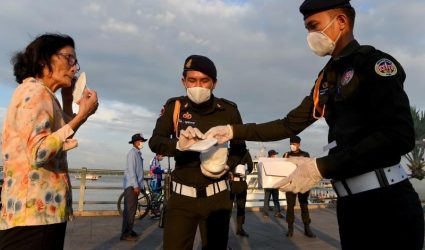Cambodia Covid-19 outbreak sparks anti-Chinese hostility

(NST) – The latest Covid-19 outbreak in Cambodia involving Chinese nationals has led to increased prejudices and castigation against the Chinese community in the capital Phnom Penh.
Since a community outbreak started on Feb 20, many of those infected in that cluster are Chinese nationals.
Although the exact origins linked to the virus’ outbreak in this cluster remains unclear, authorities have decried discrimination against the Chinese, said Global Times daily.
Health authorities said a total of 262 cases have been detected in the cluster, with 26 cases on Saturday alone. Of the 26 cases, 22 involved Chinese nationals.
The Chinese daily said this has caused cases of Chinese being castigated or ejected from public venues.
Quoting local Chinese residents, it said some Cambodians have started blaming the Chinese for the resurgence, as many cases in the current outbreak were found at a Chinese community in Phnom Penh.
A Chinese resident, known only as Lu, said there have been cases of Chinese nationals being banned from entering restaurants and the community had to keep a low profile to stay away from troubles.
“We seldom go out. Many Chinese-owned restaurants and stores suspended their business to avoid possible rumours and attacks,” he said.
Lu said the Chinese are generally very cautious about the pandemic.
He said only a few Chinese nationals had violated the local government’s pandemic control rules and most of them had just arrived in Cambodia from a third country.
“It has inadvertently negatively impacted the image of the local Chinese community here,” he explained.
In the past few days, about 50 Covid-19 infections among Chinese nationals living in Phnom Penh have been reported.
However it is from three separate infection clusters, not all caused by the two Chinese nationals who escaped from the quarantine site and headed to a nightclub.
The three infection clusters also occurred at different times but were all reported around Feb 20, igniting mass discontent for the Chinese.
On Feb 18, the Cambodian government had issued a law imposing stiffer fines for people caught defying quarantine rules.
The Khmer Times had previously reported Cambodian Prime Minister Hun Sen calling on the people to follow pandemic control protocols and not to discriminate against Chinese nationals.
Lu said lack of clarity over these cluster infections may breed misunderstanding and heighten animosity.
On Twitter, many Cambodians questioned whether hotel security has the right to release those quarantined, and what kind of transportation they subsequently took to get to a nightclub.
“The government has been vague on many details, which has led to further misunderstandings toward the local Chinese,” Lu said.
Following the outbreak, authorities have ordered the closure of all local schools for two weeks in Phnom Penh.
The Global Times said it contacted several Chinese nationals in Cambodia and all said they disapproved of the behaviours of a few compatriots that violated Cambodia’s pandemic prevention rules.
They said the rule-breakers were few and it should not represent the whole of the Chinese community in Cambodia.
On Friday night, the Cambodian Health Ministry denied that another Chinese national had escaped from the Chattali Sak quarantine centre in Phnom Penh.
Youk Sambath, Secretary of State for the ministry, said no Chinese national had fled the centre as being shared on social media.
A social media post had been circulating about the issue, with the Chinese man’s photo and details being shared.
Meanwhile, Zhang Wei, director of a Chinese travel agency based in Phnom Penh, said the Chinese community here has contributed a lot in local Covid-19 prevention and control efforts.
He said many of the companies have reportedly donated virus-fighting materials, including tens of thousands of urgently needed masks.
China Three Gorges Corporation, which runs two hydropower plants in Cambodia, said it strictly abides by the Cambodian government’s virus prevention regulations and has been administering nucleic acid tests to all of its employees in Cambodia monthly.
In 2020, the company donated US$10,000 to the Cambodian Red Cross for the purchase of personal protective equipment (PPE) for locals, according to a company statement sent to the Global Times.

